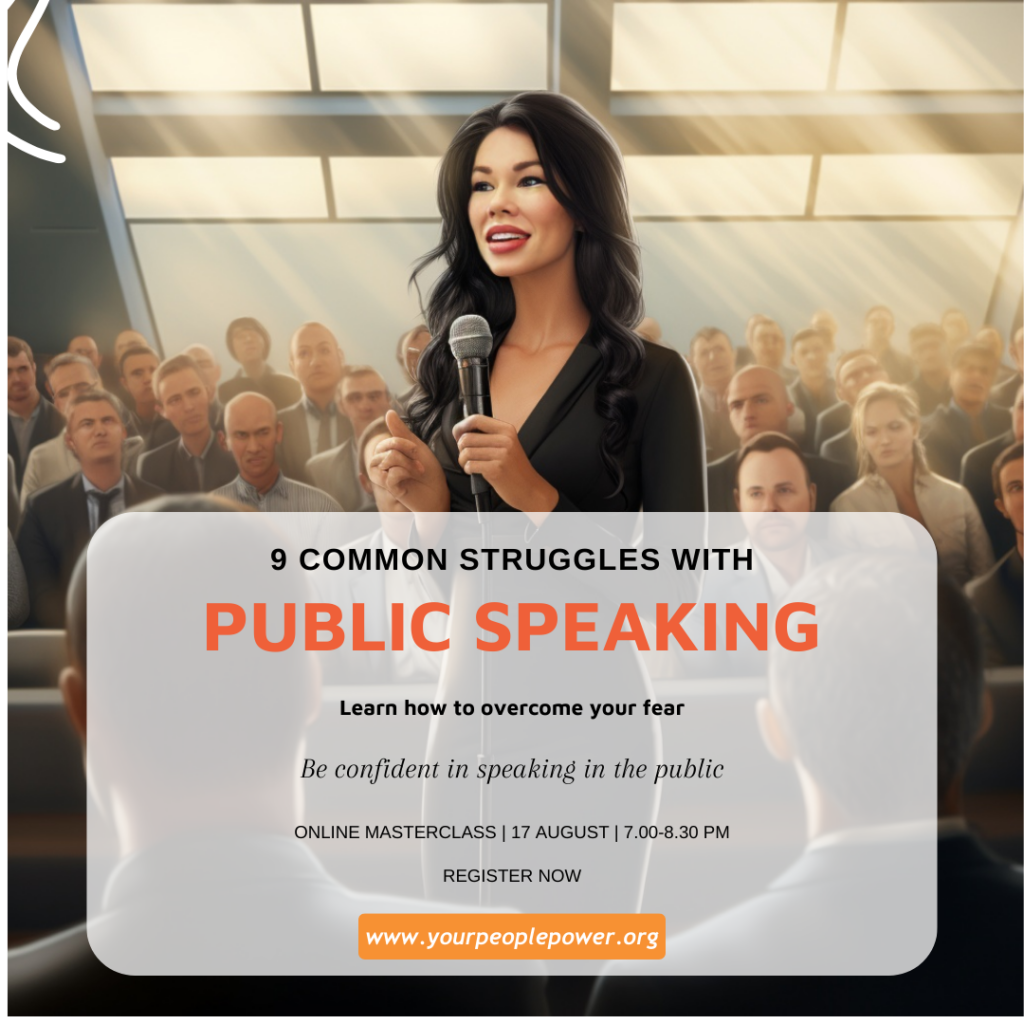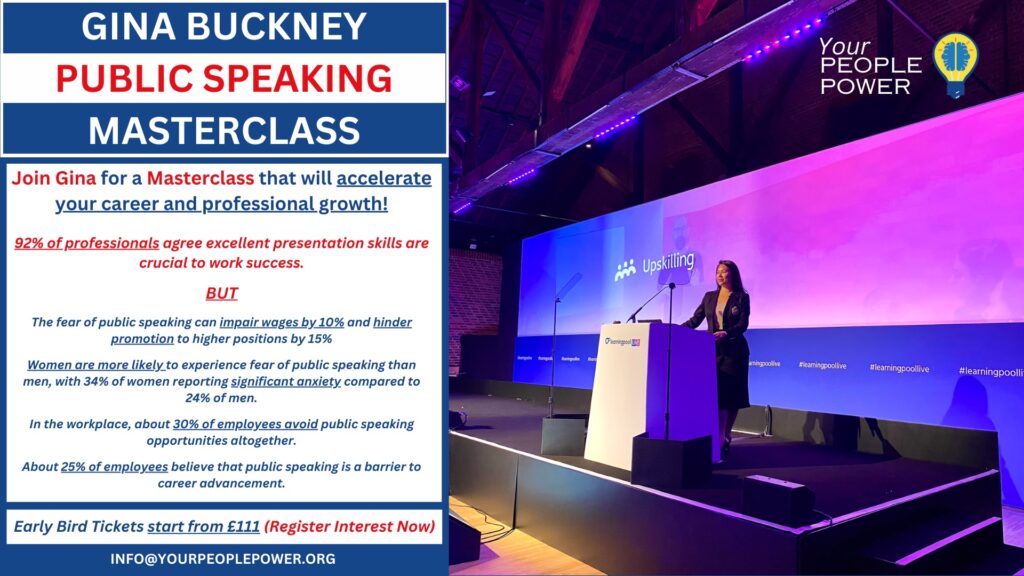9 Common Struggles of Public Speaking – How to Overcome Them

Common Struggles of Public Speaking
Public speaking is a skill that has both inspired and intimidated individuals throughout history. While some seem to effortlessly captivate audiences, many others find themselves grappling with common struggles when faced with the daunting task of addressing a crowd. Understanding these struggles of public speaking is the first step towards conquering the fear and becoming a confident and effective public speaker.
Fear and Anxiety:
Fear of public speaking, known as glossophobia, is one of the most prevalent challenges faced by individuals. The prospect of standing before a group of people, being the centre of attention, and fearing judgment can trigger anxiety and nervousness. These emotions can adversely impact the speaker’s delivery, causing stumbling over words, shaky voice, and difficulty maintaining eye contact. This is one of the most common struggles of public speaking, but one that becomes more manageable with practice.
Lack of Confidence:
Fear often goes hand in hand with a lack of confidence. Doubting one’s abilities and feeling inadequate can hinder effective communication. Without self-assurance, speakers may struggle to convey their message convincingly, leaving the audience unconvinced or disinterested. This results in a cycle where the individual is scared of speaking publicly because every time they try to, it does not go as planned.
Organisation and Structure:
Crafting a well-organised and coherent speech can be a challenge for many. Without a clear structure, speakers may become disoriented during their presentation, leading to tangents and loss of focus. This lack of organisation can make it challenging for the audience to follow the speech and grasp the key points. This is especially the case because people love stories, people pay more attention when they’re listening to a story as opposed to being presented with figures and charts.
However, crafting a good, compelling story which is relevant to the topic and emotionally investing is difficult. You often do not have much time to convey your point, so many people revert to using figures, graphs, and charts, as it is easier to read that information out to people than it is to compel them with a unique story.
The problem here is that even if people do want to practice this skill, it is something that is mostly learned through… you know… practice, which is the very thing people are afraid of doing. You have to practice to find out what kind of a speech style works for you, and then you have to learn to adapt that to suit the audience that you are addressing. Hence why this is also one of the key struggles of public speaking.

Articulation and Pronunciation:
Clear articulation and pronunciation are crucial for effective public speaking. Poor enunciation can lead to misunderstandings or misinterpretations, hindering the message’s impact and diminishing the speaker’s credibility. People tend to speak quicker when they are nervous making it more likely for them to stumble or mispronounce words. All of which automatically heighten their stress levels.
Body language, tone of voice, a dramatic pause, all of these things can make a speech more much more powerful and those are some of the things that differentiate those who speak to an audience from those that captivate them. Yet these are the very things that go out the window when stress and anxiety kick in. Even more experienced speakers still get nervous when presenting in front of an audience, hence why this is one of the most common, yet difficult struggles of public speaking to get down: learning to handle the stress and pressure.
Handling Q&A Sessions:
Engaging in question-and-answer sessions can be a source of anxiety for speakers. Unpredictable questions, challenges to their views, or the fear of not having all the answers can make speakers feel vulnerable and apprehensive about interacting with the audience. This is one of the biggest struggles of public speaking as it is almost totally out of the speakers’ control.
People can memorise their speech as it is all in your control. But a Q&A never is, it is always in the hands of the audience which can be quite intimidating. Stress, anxiety, and being in-the-moment often means that you do not think your response through in a lot of detail, leaving you with regrets on how you handled the situation down the line (weirdly enough these usually happen while taking a shower, where you manage to create a perfect response to any argument anyone has ever presented to you).
Nonverbal Communication:
Public speaking is not only about what is said but also about how it is conveyed nonverbally. Struggles with body language, facial expressions, and gestures can distract the audience and weaken the speaker’s connection with them. This is naturally something that is difficult to practice unless you stand in front of the mirror or record yourself presenting. But it is very important; your posture, where you keep your hands, whether you pace around or stand still. The audience subconsciously identifies all of these things which affect how they interpret what you are saying, or if they do so at all. This is one of the key struggles of public speaking because it is difficult to practice this without recording yourself.
Time Management:
Effective time management during a speech is vital. Speakers may find it challenging to gauge the appropriate pace and allocate sufficient time to different sections of their presentation, leading to rushed or incomplete content. Some speeches can last anything from 1 to 30 minutes, being able to accommodate this can be difficult, especially if there is a last-minute change of plans.
Visual Aids:
Incorporating visual aids, such as slides or props, can enhance a presentation. However, technical difficulties or an overreliance on visual aids may distract the audience and prevent the speaker from connecting effectively.
You want the audience to focus on you, not on your PowerPoint slides. This is a common problem when people do not find the right balance of words/content for their visual aide – the audience ends up reading the content instead of listening to you is another one of common struggles of public speaking.
Audience Engagement:
Establishing a rapport with the audience is crucial for a successful speech. Struggling to engage the audience can leave speakers feeling disconnected, and the audience disinterested. This might be the most difficult aspect of public speaking because it is once again, mostly out of your control. You must appear confident, but not intimidating, you need a backup plan in case the chosen audience member goes in a different direction than the one you were expecting (which can be the case with open-ended questions), meaning you have to be able to improvise.
Overcoming the Struggles of Public Speaking
Public speaking is a skill that can be developed and refined with practice and dedication. Here are some tips to overcome the common struggles of public speaking.
- Practice regularly: Familiarity breeds confidence, so practice your speech multiple times before the actual presentation.
- Seek feedback: Constructive feedback from peers or mentors can help identify areas for improvement.
- Record yourself: Recording your practice sessions allows you to identify specific areas that need work, such as nonverbal cues and tone.
- Start small: Begin with smaller, more familiar audiences to build confidence gradually.
- Focus on breathing and relaxation techniques: Managing anxiety can significantly improve your delivery.
- Prepare thoroughly: Organise your speech well and anticipate potential questions during Q&A sessions.
- Engage the audience: Involve the audience through questions, anecdotes, or interactive elements.
Public speaking may remain challenging for some, but with persistence and commitment, these struggles can be overcome. Embracing the journey of improvement and acknowledging that even experienced speakers face challenges can help individuals gain confidence and become more effective communicators in front of any audience.
Looking to improve your public speaking skills? Find out more about our Public Speaking Masterclass now! It is hosted by Gina Buckney, a 2x TEDx speaker and the director of Your People Power and overcome the struggles of public speaking.
Click here to find out more about how we can support your business, and your people.
If you are part of a workplace doing great things in the area of workplace wellbeing and employee wellness and would like to be featured in a future article, please get in touch with one of our team today, or contact us here. We love to learn and share details of companies doing fantastic things to support their people.
Recent Posts
- Corporations Fit For The Future: Three Women. One Mission. 5 July 2025
- KPMG’s Wellbeing Blueprint: 🌍 YPP Spotlight 30 June 2025
- Microsoft’s Culture Of Inclusive Allyship Leads The Way: 🌍 YPP Spotlight 24 June 2025
- How remote-first tech powerhouse, Atlassian, strives to build a Global Culture of Care, one Wellness Day at a time 16 June 2025
- From Toxic to Thriving: The Business Case for Kindness in the Workplace 9 June 2025